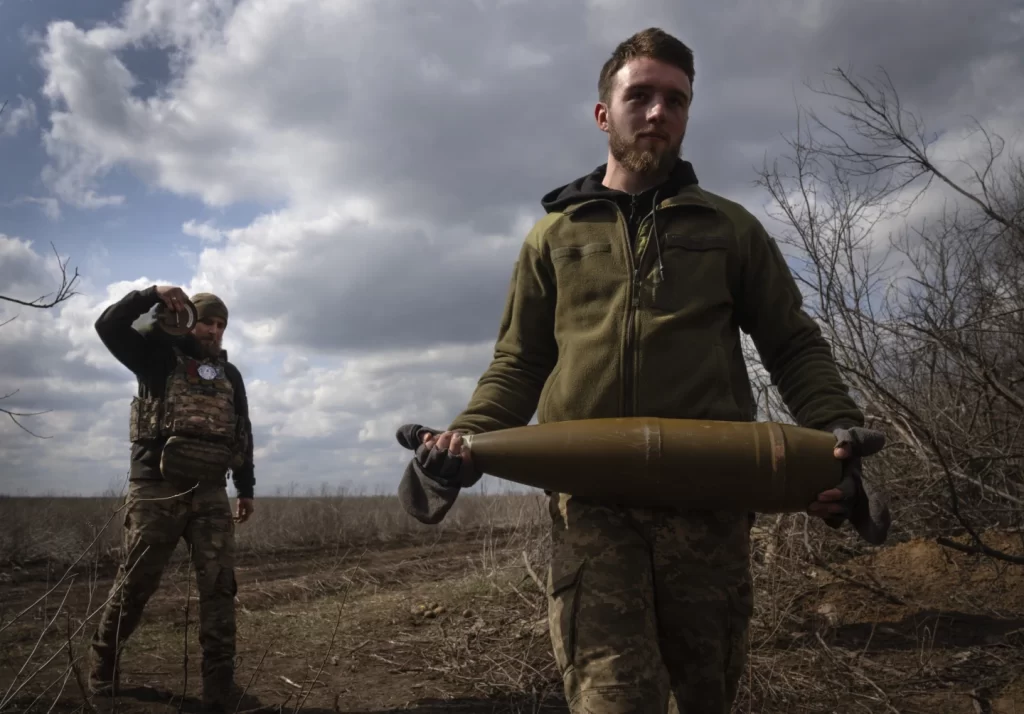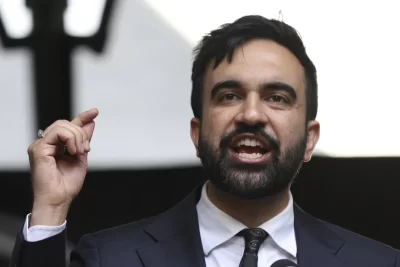
KYIV, Ukraine — After almost 30 months of war with Russia, Ukraine’s difficulties on the battlefield are mounting even as its vital support from the United States is increasingly at the mercy of changing political winds.
A six-month delay in military assistance from the U.S., the biggest single contributor to Ukraine, opened the door for the Kremlin’s forces to push on the front line. Ukrainian troops are now fighting to check the slow but gradual gains by Russia’s bigger and better-equipped army.
“The next two or three months are going to be probably the hardest this year for Ukraine,” military analyst Michael Kofman of the Carnegie Endowment said in a recent podcast.
Lurking in the background is another nagging worry for Ukraine: how long will Western political and military support critical for its fight last?
On Monday, former President Donald Trump chose Sen. JD Vance of Ohio as his running mate for the Republican ticket in November’s U.S. election, and Vance wants the United States to attend to its own problems — not necessarily a war thousands of miles away on a different continent, even though he has said Putin was wrong to invade.
That view dovetails with Trump’s own stance. Trump has claimed that if elected, he would end the conflict before Inauguration Day in January. He has declined to say how.
Meanwhile, Hungary’s pro-Russian Prime Minister Viktor Orbán — whose country holds the European Union’s rotating presidency — recently infuriated other EU leaders by holding rogue meetings with Putin and Chinese President Xi Jinping.
Europe’s biggest war since World War II has already cost tens of thousands of lives on both sides, including thousands of civilians. There is no sign of it ending any time soon.
And Putin wants to draw out the war in the hope of sapping Western willingness to send billions more dollars to Kyiv.
Here’s a look at Ukraine’s major challenges:
The battlefield
Russia holds 18% of Ukrainian territory, after defensive forces pushed it out of half of the area it seized following its full-scale invasion in February 2022, the Council on Foreign Relations, a U.S. think tank, said in May. In 2014, Russia seized Ukraine’s Crimea.
Russia hasn’t accomplished a major battlefield victory since taking the eastern stronghold of Avdiivka in February. But its forces are now pushing in border regions: Kharkiv in northeast Ukraine, Donetsk in the east and Zaporizhzhia in the south.
To buy time, Ukraine has employed an elastic defense strategy by ceding some territory to wear down Russian troops until Western supplies reach brigades. But, analysts warn, Russia will undoubtedly win a lengthy war of attrition, unless Ukraine can strike using an element of surprise.
Russia claimed Sunday its forces had taken control of the Donetsk village of Urozhaine, but Ukrainian officials said there was still fighting there. Moscow’s army is aiming to take the nearby strategic hilltop city of Chasiv Yar, which could allow it to drive deeper into Donetsk.
Ukraine’s forces are largely holding back the Russian push around northeastern Kharkiv city, according to the Institute for the Study of War, a Washington think tank. The Kremlin’s troops have been trying to get within artillery range of the city and create a buffer zone in the region to prevent Ukrainian cross-border attacks.
Meanwhile, Russia is firing missiles into rear areas, hitting civilian infrastructure. Last week it conducted a massive aerial attack that killed 31 civilians and struck Ukraine’s largest children’s hospital in Kyiv.
The power grid
Crippling Ukraine’s electricity supply has been a key goal of Russia’s relentless long-range missile and drone attacks.
Ukrainian President Volodymyr Zelenskyy says the bombardment has destroyed 80% of Ukraine’s thermal power and one-third of its hydroelectric power.
A hard winter likely lies ahead for Ukraine, analysts say.
Ukraine is such a large country that massive air defenses would be needed to protect it all. The country needs 25 Patriot air defense systems to fully defend its airspace, Zelenskyy said Monday.
Ammunition
New deliveries of ammunition to Ukraine are trickling to units along the line of contact, shrinking Kyiv’s heavy disadvantage in artillery shells and allowing it to start stabilizing the front line.
But it will take time for Kyiv’s army to fully replenish its depleted stocks. Ukraine won’t be able to assemble a counteroffensive until late this year at the earliest, military analysts estimate.
Russia, meanwhile, is spending record amounts of money on defense to finance its grinding war of attrition.
Fortifications
Russia’s go-to tactic is to smash towns and villages to pieces, rendering them unlivable and denying Ukrainians defensive cover. Powerful glide bombs flatten buildings. Then the Russian infantry moves in.
Ukraine was late to build defensive lines but its fortifications have improved in recent months, according to analyst reports.
The Russian army has made creeping progress at eastern and southern points along the roughly 1,000-kilometer (600-mile) front line but has not recently made any significant breakthrough and its advances have been costly, Ukrainian officials say.
Expanded military conscription
Ukraine in April adopted an expanded military conscription law that aimed to replenish its depleted and exhausted forces.
Zelenskyy said Monday the drive is going well, though the country doesn’t have enough training grounds for the new troops. Also, 14 brigades haven’t yet received their promised Western weapons.
Weaponry
NATO countries have taken steps this month to ensure that Ukraine keeps receiving long-term security aid and military training.
Alliance leaders attending a summit in Washington last week signed a deal to send more Stinger missiles, a portable surface-to-air defense system.
Ukraine is also preparing to receive the first F-16 warplanes donated by European countries.
Even so, Zelenskyy is frustrated. He says Ukraine cannot win the war unless the U.S. scraps its limits on the use of its weapons to attack military targets on Russian soil.




